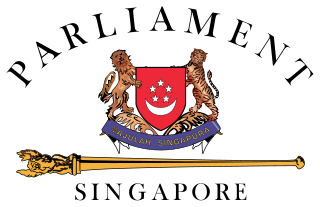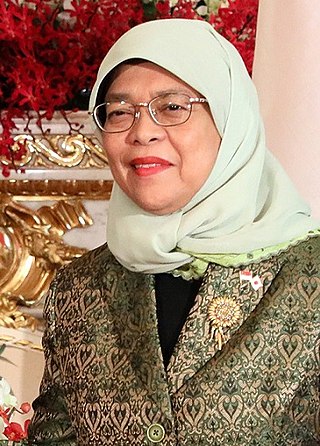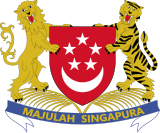
Singapore is a parliamentary representative democratic republic in which the president of Singapore is the head of state, the prime minister of Singapore is the head of government, and of a multi-party system. Executive power is exercised by the Cabinet from the parliament, and to a lesser extent, the president. Cabinet has the general direction and control of the government and is accountable to Parliament. There are three separate branches of government: the legislature, executive and judiciary resembling by the Westminster system. Singapore has been described as being a de facto one-party state.

The president of the Republic of Singapore is the head of state of Singapore. The president represents the country in official diplomatic functions and possesses certain executive powers over the Government of Singapore, including the control of the national reserves and the ability to revoke and appoint public service appointments.

The Singapore Democratic Party is a social liberal political party in Singapore. Having peaked at three seats after the 1991 general election, the party currently has no seats in Parliament since 1997.

The government of Singapore is defined by the Constitution of the Republic of Singapore to consist of the President and the Executive. Executive authority of Singapore is vested in the President but exercised on the advice of the Cabinet led by the Prime Minister. The President, acting as the Head of State, may only act in their discretion in appointing the Prime Minister, acting as the Head of Government; as well as withholding consent for the dissolution of Parliament; along with performing key checks on the Government in addition to the ceremonial duties of the Head of State inherited from the Westminster system. The Cabinet, consisting of the Prime Minister and ministers appointed by the President on the Prime Minister's advice, is responsible for heading the Executive through ministries and other statutory boards. At the end of the term or at any time during the term, once the President has consented to a request made by the Prime Minister to dissolve Parliament, Parliamentary General Elections are held to elect members of Parliament for a new term. The President, in their discretion, then appoints a Prime Minister who is a member of Parliament representing any political party or coalition of political parties who in their judgement is likely to command the confidence of the majority of the members of Parliament. The Prime Minister then forms the Government and, along with the Cabinet, sets the general direction and control of the Government for the next term.

The Cabinet of Singapore forms the executive branch of the Government of Singapore together with the president. It is led by the prime minister who is the head of government. The prime minister is a Member of Parliament (MP) appointed by the president who in the president's judgment is likely to command the confidence of the majority of the Members of Parliament (MPs). The other ministers in the Cabinet are Members of Parliament appointed by the president acting in accordance with the advice of the prime minister. Ministers are prohibited from holding any office of profit and from actively engaging in any commercial enterprise.

The Parliament of Singapore is the unicameral legislature of the Republic of Singapore, which governs the country alongside the president of Singapore. Largely based upon the Westminster system, the Parliament is made up of Members of Parliament (MPs) who are elected, as well as Non-constituency Members of Parliament (NCMPs) and Nominated Members of Parliament (NMPs) who are appointed. Following the 2020 general election, 93 MPs and two NCMPs from three political parties were elected to the 14th Parliament. Throughout the sitting of Parliament, nine NMPs are usually appointed by the president on a biennial basis.

The Presidential Council for Minority Rights (PCMR) is a non-elected government body in Singapore established in 1970, the main function of which is to scrutinize most of the bills passed by Parliament to ensure that they do not discriminate against any racial or religious community. If the Council feels that any provision in a bill amounts to a differentiating measure, it will report its findings to Parliament and refer the bill back to Parliament for reconsideration. The council also examines subsidiary legislation and statutes in force on 9 January 1970. One member of the PCMR is nominated by the chairman to the Presidential Elections Committee, which is empowered to ensure that candidates for the office of President have the qualifications required by the Constitution. The President also appoints and dismisses the chairman and members of the Presidential Council for Religious Harmony ("PCRH"), established by the Maintenance of Religious Harmony Act, on the advice of the PCMR, and the PCMR is responsible for determining whether PCRH members who are not representatives of major religions in Singapore have distinguished themselves in public service or community relations in Singapore.

The Constitution of the Republic of Singapore is the supreme law of Singapore. A written constitution, the text which took effect on 9 August 1965 is derived from the Constitution of the State of Singapore 1963, provisions of the Federal Constitution of Malaysia made applicable to Singapore by the Republic of Singapore Independence Act 1965, and the Republic of Singapore Independence Act itself. The text of the Constitution is one of the legally binding sources of constitutional law in Singapore, the others being judicial interpretations of the Constitution, and certain other statutes. Non-binding sources are influences on constitutional law such as soft law, constitutional conventions, and public international law.

Chan Heng Chee is a Singaporean academic and diplomat who has been serving as Ambassador-at-Large at the Ministry of Foreign Affairs since 2012, Chairwoman of the National Arts Council and Member of the Presidential Council for Minority Rights. She had also served as Singapore Ambassador to the United States between 1996 and 2012.
Zainul Abidin bin Mohamed Rasheed is a Singaporean diplomat, former politician and journalist. A former member of the governing People's Action Party (PAP), he was the Member of Parliament (MP) representing Eunos ward of Aljunied GRC between 2001 and 2011 and Cheng San GRC representing Punggol East ward from 1997 to 2001.

A group representation constituency (GRC) is a type of electoral division or constituency in Singapore in which teams of candidates, instead of individual candidates, compete to be elected into Parliament as the Members of Parliament (MPs) for the constituency. Synonymous to the party block voting (PBV) or the general ticket used in other countries, the Government stated that the GRC scheme was primarily implemented to enshrine minority representation in Parliament: at least one of the MPs in a GRC must be a member of the Malay, Indian or another minority community of Singapore. In addition, it was economical for town councils, which manage public housing estates, to handle larger constituencies.

Presidential elections were held in Singapore on 28 August 1993. Following amendments to the Constitution in 1991, presidential elections since then are to be directly elected by citizens. Incumbent president Wee Kim Wee, who had been elected by Parliament in 1989, did not seek re-election.

The powers of the president of Singapore are divided into those which the president may exercise at their own discretion, and those they must exercise in accordance with the advice of the Cabinet of Singapore or of a minister acting under the general authority of the Cabinet. In addition, the president is required to consult the Council of Presidential Advisers (CPA) when performing some of their functions. In other cases, the president may consult the CPA if they wish to but is not bound to do so.

Presidential elections in Singapore, in which the President of Singapore is directly elected by a popular vote, were introduced after a constitutional amendment made in 1991. Potential candidates for office must meet stringent qualifications set out in the Constitution. Certificates of Eligibility are issued by the Presidential Elections Committee (PEC). In particular, the PEC must assess that they are persons of integrity, good character and reputation; and if they have not previously held certain key government appointments or were the chief executives of profitable companies with shareholders' equity of an average of S$500 million for the most recent three years in that office, they must demonstrate to the PEC that they held a position of comparable seniority and responsibility in the public or private sector that has given them experience and ability in administering and managing financial affairs.

Halimah binti Yacob is a Singaporean politician and lawyer who held the office of the eighth president of Singapore from 2017 to 2023, making history as the first woman to serve in this role.
The Maintenance of Religious Harmony Act 1990 ("MRHA") is a Singapore statute which, according to its long title, provides for the maintenance of religious harmony, for the establishment of a Presidential Council for Religious Harmony ("PCRH"), and for matters connected therewith.

Singapore has a multi-party parliamentary system of representative democracy in which the President of Singapore is the head of state and the Prime Minister of Singapore is the head of government. Executive power is vested in the President and the Cabinet. Cabinet has the general direction and control of the government and is collectively responsible to the Parliament. There are three separate branches of government: the legislature, executive and judiciary.

The Separation of powers in Singapore is governed by Constitution of the Republic of Singapore, which splits the power to govern the country between three branches of government – the parliament, which makes laws; the executive, which executes them; and the judiciary, which enforces them. Each branch, while wielding legitimate power and being protected from external influences, is subject to a system of checks and balances by the other branches to prevent abuse of power. This Westminster constitutional model was inherited from the British during Singapore's colonial years.

By-elections in Singapore are elections held to fill seats in the Parliament of Singapore that fall vacant in between general elections, known as casual vacancies. In the past, the Government of Singapore took the position that the Prime Minister had discretion whether or not a by-election should be called to fill a casual vacancy in a Single Member Constituency, and could leave a parliamentary seat unfilled until the next general election. However, in the case of Vellama d/o Marie Muthu v. Attorney-General (2013), which arose from a vacancy in Hougang Single Member Constituency, the Court of Appeal held that the Constitution of Singapore obliges the Prime Minister to call a by-election unless a general election is going to be held in the near future. However, a by-election need only be called within a reasonable time, and the Prime Minister has the discretion to determine when it should be held.

Presidential elections were scheduled to be held in Singapore on 13 September 2017. Following amendments to the Constitution of Singapore, which resulted in the elections being reserved for candidates from the Malay community, incumbent president Tony Tan, who had been elected in 2011, was ineligible to seek re-election.








